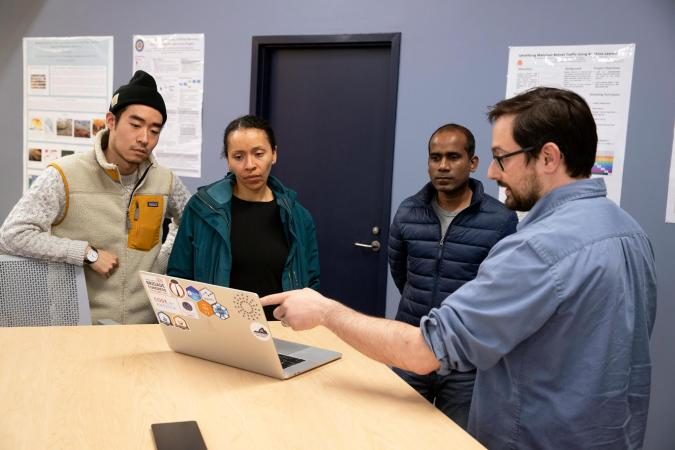Code for Charlottesville Expands

Code for Charlottesville has grown tremendously since its start in the fall of 2019, with three exciting new projects in the works.
Jonathan Kropko, Assistant Professor at the School of Data Science, first heard about Code for America after attending a hackathon event in Raleigh. He worked with UVA statistics student Elyse Lee, to create the Code for Charlottesville Chapter. Since the fall of 2019, Charlottesville community members have been gathering (virtually since COVID-19) to collaborate, code, and work together on important issues in Charlottesville.
Code for Charlottesville is wrapping up its project with housing navigation, after a project helping the local fire department.
“The goal that I've had over the last few months is to expand Code for Charlottesville as an organization to bring in more people at the leadership level, specifically people who can organize what the brigade does overall,” Kropko said.
The team now has 16 people at the leadership level.
“They're really wonderful people who are now involved, and with all that energy, we're turning it [Code for Charlottesville] towards three new projects at the same time,” Kropko said.
These three projects are working with the city street light network, criminal record expungement, and pro bono IT consulting. Code for Charlottesville will be holding a new volunteer information session on Monday Feb. 22 at 7:30pm. Anyone from the UVA and Charlottesville community is invited to attend by registering here.
Kropko broke down the three new projects and the group’s goals within each endeavor.
Charlottesville City Street Light Network
“Streetlights are a really important thing for civic life. Better lighting is associated with less crime and greater economic activity after dark,” Kropko explained. “Not to mention, it makes it easier for people just to walk at night.”
Kropko explained that the city street light network is maintained by Dominion Energy.
Code for Charlottesville wants to gather detailed data on the current street light network system in Charlottesville.
“We're trying to build a tool that maps out where all the streetlights are on a GIS map and contains data about each streetlight, such as what kind of bulb is used, what kind of fixture it is, and how much light is emitted,” Kropko said.
To gather and understand this data, Code for Charlottesville teamed up with the Charlottesville Climate Protection Program. This effort of the Charlottesville local government is committed to a citywide emissions reduction goal.
Kropko explained that the team is currently still in the process of gathering all of this data. With the data they currently have, the team is working on what they can do with this data to create change.
“Right now, we're trying to get connected to Dominion Energy now through the government.”
Code for Charlottesville, together with the Charlottesville Climate Protection Program, hopes to gain a better understanding of the current street light network through this data, with the overarching goal of this information being used to increase safety in a way that is also environmentally safe.
Criminal Record Expungement
The second project Code for Charlottesville is working on is on criminal record expungement.
Kropko explained that up until now, the state of Virginia has been a very restrictive punitive system when it comes to criminal records.
“If you've ever been charged with a crime, not convicted, but just charged, whether that's a felony or a misdemeanor, you end up with a criminal record,” Kropko detailed. “That criminal record pops up on criminal background checks anytime you apply for a job, any kind of housing, or a loan.”
“It creates these really hard barriers for people to overcome just to be able to access fundamental avenues of opportunity,” Kropko said. “Having a very restrictive criminal background check system ends up creating a permanent underclass.”
Code for Charlottesville is teaming up with the Legal Aid Justice Center [LAJC] and the Code for Hampton Roads brigade to compile more data in this area.
Specifically, Kropko and the team are looking into expungements in the state of Virginia.
“Expungement is the process hiding the court documents about the criminal case from public view, so that it no longer pops up on background checks,” Kropko explained. “The efforts in the Virginia legislature are to make more records eligible for expungement, because right now almost nothing is expungeable.”
In the Code for Hampton Roads team, a volunteer created a web scraper that is collecting all of the individual criminal records in the state. This tool builds bulk download files, of cases going back 20 years.
“We're going to use those to do analytics to better understand how many records exist in Virginia that are expungeable, but haven't actually been expunged,” Kropko said.
The Virginia Legislature is currently working to expand the expungement system, which Kropko explained they hope to be automatic some day. This would mean an individual’s record would immediately be erased without them having to apply to expungement or pay any court fees. These create more barriers to economic opportunity.
“We are building a data analytics platform on the cloud that people at the LAJC and volunteers at Code for Charlottesville with a data science background, can come on and start to do analyses to answer questions that the LAJC has,” Kropko explained. “This will help understand things about racial disparity in the legal system and get a sense of how many records can be expunged, what sorts of records are more likely to be ruled in a certain way, versus an alternative way.”
Kropko added that the team is also working with Jason Williamson, Professor at the School of Data Science and Vice President at Oracle for Startups and Research. Williamson has been helping the team with cloud resources to set up this analytics platform.
Pro Bono IT Consulting
The third project is referred to by the Code for Charlottesville team as “The Shop.”
Kropko explained that “The Shop” is a series of several smaller tech projects for nonprofits throughout Charlottesville.
“We're building documentation, templates, and as many reusable tools as we can in order to make it most efficient to be able to help nonprofits,” Kropko said.
For this project, Code for Charlottesville is working with the Center for Nonprofit Excellence [CNE], an organization that provides training and executive education for nonprofits in Charlottesville and Central Virginia.
Working with CNE connects Code for Charlottesville to a wide network of nonprofits in the region.
“Some of the nonprofits need things for their websites,” Kropko said. “But the thing is, if we work to build a website for a small nonprofit, we want to be able to do it in a principled way, where that website is built for the Internet of 2021, where it can maybe be easily translated into other languages, be ADA accessible, other things like that.”
Kropko explained how a project such as building a website for a nonprofit would be used within “The Shop.”
“We want to build that website in a way that we can then give it to another nonprofit with just swapping out the images. It’ll look different, but it still has all of the good properties that the first website we built will have. That's the idea of the shop.”
The Code for Charlottesville Team
Kropko and the team are excited about the new projects they are taking on, as well as continuing to build the organizational structure of the group
“It’s going to continue to be an adventure, and it's going to continue to be a challenge because this is part of a national movement,” he noted. “Code for America is a great national network, and there are conferences and a slack board and we communicate and share ideas, but this work also requires being deeply part of the community here.”
Kropko went on to explain that there is often a tension between towns and tech. There is a fear surrounding what the tech industry will do to housing prices. Kropko hopes Code for Charlottesville is a bridge in this tension, as the team takes on projects to help make Charlottesville a better place.
“Everyone on the team is also working a full-time job, and they are amazing,” Kropko said. “It feels like there's good momentum with the team and with people throughout Charlottesville. It’s all really exciting.”
Join Code for Charlottesville this Monday, February 22 from 7:30pm - 9:00pm for its 2021 Kickoff! More information here.
